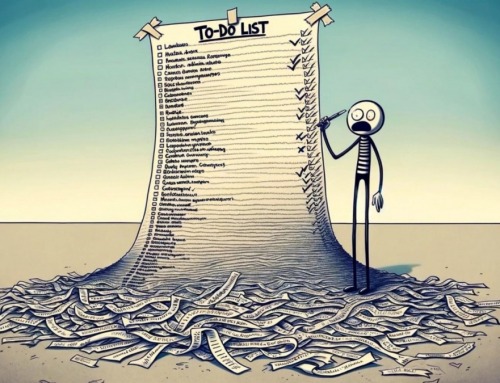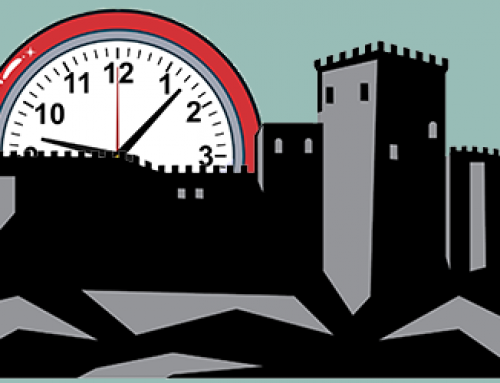Look, we’re on your side with this one: life is filled with so many things that you just flat out don’t want to do. Maybe it’s because they’re unpleasant, maybe you’re just mentally exhausted and stressed, or maybe it’s just that your bed is feeling super comfortable right now!
Unfortunately, to get anything done in life, you must exercise disciplined effort to reach and crush our goals. And that means dragging ourselves forward so you can do the things you really don’t want to do when you don’t want to do them.
One of the most important keys to success is having the discipline to do what you know you should do. Even when you don’t feel like doing it.
Increase your effectiveness with PlanPlus Online.
A productivity system for leaders.

Tackle the problem head on
The most obvious and direct solution is just to do it and get it done. It really doesn’t need to be any more complicated than that.
Otherwise, we get stuck in the Avoidance Zone. The Avoidance Zone is that space of being in which there’s something important that you need to get done, but you keep putting it off. You put it off by getting to work on unimportant things: items that are lower down on your list of priorities; tasks that someone else should be doing; or mindless activities like checking your twitter feed for the umpteenth time.
It’s an awful place be to be in, full of dread and anxiety. The task that you need to get to is always looming in the back of your mind, no matter how much you try to think of other things.
In addition, when you’re in the Avoidance Zone you’re not getting anything important done. Therefore, you’re suffering, but you have nothing of value to show for that suffering.
You cannot escape the responsibility of tomorrow by evading it today.
To make matters worse, the longer you put something off, the scarier it gets. The task that must be done, but that you’re desperately avoiding, gets bigger and uglier with every passing day. And the bigger and uglier it gets, the harder it is to get to it.
Everyone is faced with doing things you really don’t want to do. Many times, you just don’t want to do these things, but you can put your head down and do them anyway—because you don’t have a choice in the matter.
You can strive to eliminate procrastination by choosing to view all of the things you need to do as necessary and tackling them as they come up.
Create a schedule and commit to keeping it
It’s much easier to accomplish goals and work through the low times by having some sort of schedule.
A general schedule of somewhat consistent times can introduce structure, improve creativity as your mind switches on, and guide you in the general direction of where you want to go.
What part of your life is presently suffering that requires the need to just do whatever you need to do? That’s a good place to start!
Maybe it’s studying for a couple hours before a set bedtime, exercising for a half hour block in the morning, or planning out preparation time for bulk cooking of healthier meals on the weekend.
A schedule gives you predictability that you can build on and around as you push toward your goals.
Work on the task for 5 minutes
Large projects can feel overwhelming. They can be so daunting that they can be intimidating, so we procrastinate and put off the project, whether we want to do it or not.
You can combat that feeling by making an agreement with yourself to work on it for just five minutes and see how you feel about it then.
Most of the time, you’ll find that the initial feelings of trepidation and dread melt away as you start digging into your project.
It’s easier to resist at the beginning than at the end.
The doubt, fear, and frustration in our own minds are usually the hardest hurdles to clear when we’re faced with unpleasant or tedious tasks.
Agree to work on the task for just five minutes and see if you aren’t okay with continuing on the process.
Break an unpleasant task down into bite-sized pieces
This tip works if you’re faced with a larger task. It can be much easier to get through a large, unpleasant task if you break it down into pieces that we can tackle throughout the day.
Aim for about half hour chunks, or time blocks, that you can do between other activities or work. The benefit is that this approach will reduce mental fatigue and allow you to focus more on the task in the blocked off time.
The same principle can be applied to running errands, doing housework, or just about anything.
Focus on the benefits of actually completing the task
One way that you can sidestep those feelings of not wanting to do things is to focus on the benefits you’ll gain from completing the task.
No one likes to do housework, but a clean house helps reduce general anxiety, is pleasant to look at and live in, and staves off the general buildup of dirt and dust.
Do you really want to study? Maybe or maybe not. But, you probably do want to maintain good grades, or gain a skill, and reap the benefits of a quality education.
Amateurs sit and wait for inspiration. Pros just get up and go to work.
Even endeavors that you normally find fun or relaxing may not always seem as appealing to you as they normally would.
It’s still worth following through on that activity if you want to continue to build on the momentum of what you have already accomplished.
Understand that you don’t need to listen to your thoughts
Many people use their feelings as the primary decider for what they do and do not do. Unfortunately, feelings can oftentimes be wrong, misinformed, or not relevant to the present situation.
Far too many people accept their feelings as truth, when they’re not. They’re just a perception of whatever we’re experiencing.
The goal is not to avoid emotions altogether, but to prevent emotions from tainting your decision-making processes surrounding your goals and desires in life.
It’s okay to take a break
Life is about balance. The day-to-day grind of the world can wear a person down. If you’ve been pursuing a goal hard for a long time, sometimes you just need to slow down and take a break.
No one can be 100% on point, all day, every day, all the time. It’s an impossible standard that you’ll never live up to and will guarantee that you burn out.
If you’ve been on the grind for a long time, it’s okay to take a break! It’ll keep you from burning out and derailing your progress. Be kind to yourself. You’re not a machine, and that’s okay too.







